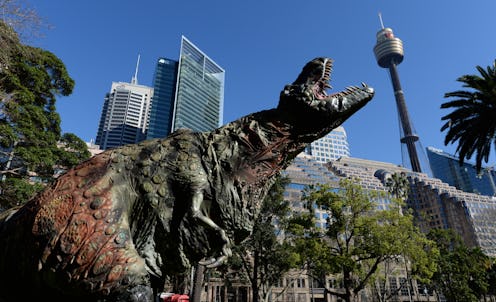Life
Humans May Be To Blame For A New Mass Extinction
Scientists at Stanford University have warned that Earth has begun a sixth mass extinction, thanks to hundreds of years of pollution, climate change, and destruction of habitats. In fact, researchers claim we're undergoing the biggest mass extinction since the dinosaurs were wiped out at the end of the Cretaceous Period 65 million years ago. If you're hoping that this is hyperbole designed to scare humanity into getting itself together, I have bad news — Stanford professor Paul Ehrlich told the Telegraph that their calculations "very likely underestimate the severity of the extinction crisis," and it is "without any significant doubt" that a period of mass extinction is upon us.
Researchers arrived at this (terrifying) conclusion by estimating the normal rate of extinctions, using fossil records and a variety of extinction counts, then comparing this "background rate" with the current rate at which species are lost. According to the Telegraph, the typical rate is two species of mammal going extinct every 10,000 years. The current rate is more than
one hundred times higher, and Live Science reports that "the species lost in just the past hundred years would have taken up to 11,400 years to be lost" if it weren't for... you guessed it: us!
Humans have a bit of a history when it comes to wiping out entire species of animals, even before industrialization started turning rain forests into barren wastelands. Scientists believe that early humans are responsible for the extinction of mammoths, giant sloths, and various other kinds of megafauna thousands of years ago. More recently, the dodo bird became the poster bird for human destruction when the last of its kind was killed in 1681. Since then, however, hundreds of animals have died out, from the Japanese Sea Lion in 1951 to the Formosan Clouded Leopard in 2013.
If the current rate of extinction is left unchecked, "life would take many millions of years to recover, and our species itself would likely disappear early on," lead author Gerardo Ceballos told the Telegraph.
There is hope, however, as long as humanity can get its act together long enough to work together to conserve the environment. "Avoiding a true sixth mass extinction will require rapid, greatly intensified efforts to conserve already threatened species, and to alleviate pressures on their populations," the study reads, emphasizing the need to address "habitat loss, over-exploitation for economic gain and climate change."
This isn't the first time researchers have warned us of the impending Holocene extinction, named after the current Holocene epoch, but the situation continues to worsen. To get an idea of how great an impact humanity has had on Earth, check out the infographic below from Live Science:
Way to go, humanity. This is why we can't have nice things.
Images: fightforspacefilm/Tumblr; Giphy; Live Science
